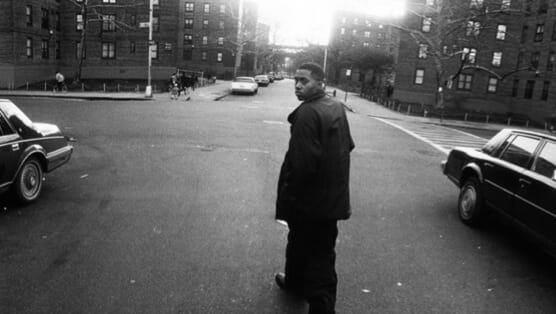
There are still some who would argue that hip-hop music hasn’t yet earned its place in intellectual discourse. Those people have most likely not encountered Nas’ 1994 debut album, Illmatic. But, not to worry. Twenty years later, director One9 and writer Erik Parker offer those of us who might have missed it the first time around, another chance to experience the autobiographical auricular portrait of Nasir Jones’s life in the Queensbridge Housing Projects (the largest public housing development in America) of Queens New York. Time is Illmatic is a powerful, difficult film to watch—an invitation to a world with which many of us are unfamiliar, a world out of which few of us would have survived, let alone gone on to be hailed artistic geniuses. Among many things, the film is what we expect it to be, as a celebration of Nas’ triumphs, and a portrait of the artist and prolific lyricist as a young man. Where Time is Illmatic soars and surprises, is in its historical approach to this portrait, and in its portrayal of another side of the artist—his brother, Jungle.
Like most traditional music documentaries, One9 offers his audience a certain intimacy with Nas’ family, as we meet the individuals who helped mold the rapper. His father, Olu Dara Jones, played a key role in his appreciation for music, instruments, literature, and politics. Jones encouraged both of his sons to educate themselves—going so far as to suggest they drop out of the Queens public high schools altogether. Nas’ unique relationship with his father—a jazz musician with a large presence, who was also physically absent during much of his children’s upbringing (leaving their mother with the brunt of the work)—functions as one of a series of choruses in the soundtrack of the rapper’s life, which he would later brilliantly document on Illmatic.
But for those of us who have followed Nas’ career, and even listened to his father on some of his tracks, the historical and anthropological bent is the first surprising and compelling element of the documentary. Early on, Parker and One9 make it clear that their intent is to tell a history of New York City. They focus on the troubling 1980s climate, where an atmosphere of poverty, drugs (and the war on it)—along with the passion for musical expression that has always existed in a unique way in the black American community—gave birth to rap.
The opening to Time is Illmatic is, therefore, reminiscent of Ken Burns’ Central Park Five—it’s a dark, gritty look at the American dream, deferred for another generation. And Jungle becomes the other voice of that generation. Among famous faces like Alicia Keys, Q-Tip and Kendrick Lamar (who all speak about the impact Nas’ debut had on their careers), Jungle seemingly demands and commands his own limelight. As if to combat the “pick yourself up by the bootstraps” mentality (of which someone like Nas might be more emblematic), Jungle’s brutally honest interviews offer a different kind of insight. His takes are necessarily frightening. Nas has distance from the world in which he grew up, but Jungle—like most Queensbridge natives—is still right there, in many ways. His description of getting shot, and bearing witness to the death of his childhood friend and Nas’ in the same shooting (Willie “Ill Will” Graham, who was 20 years-old at the time), is one of the most difficult scenes to watch, and, perhaps, the most crucial scene of the film.
These are the types of narratives Nas was able to, somehow, capture perfectly in Illmatic. The content of his lyrics—and the personal histories behind them, which rightfully take up so much of Time is Illmatic—also warn against any romanticization of hip-hop. For, even as rap culture enters the academic sphere—and even as it should—classic hip-hop projects like Illmatic were born out of communities marginalized by the very elitist systems that must be aligned with academia. This project is a reminder of that conflict.
Time is Illmatic also helps to define this new style of the hip-hop doc, where the music is just one part of the educational experience. Clips of Nas performing songs from Illmatic in the present day play against footage of the rapper from the early ‘90s, all of which is made more interesting when we see him sitting next to cultural theorist and historian Henry Louis Gates Jr. Nas is shown being honored at The Hip Hop Archives of Harvard University last year, and the scene is a reminder of another important rap documentary that recently hit the festival circuits, The Hip-Hop Fellow. Alongside Steve Stoute’s VH1 docu-series The Tanning of America, a very powerful statement is being made: hip-hop has always been, inherently, intellectual and culturally relevant. Nas’ lyrics on songs like “New York State of Mind” (“It drops deep as it does in my breath/I never sleep ‘cause sleep is the cousin of death/Beyond the walls of intelligence life is defined/I think of crime when I’m in a New York state of mind”) and “One Love” are a testament to this.
At the risk of romanticizing Time is Illmatic, it should be said that these images of Nas performing his seminal tracks, along with Jungle’s testimonies, give the film an almost operatic quality. Even if you don’t speak the language (and there’s a very good chance that you do not), One9 and Parker offer a tragic, beautiful, and hopeful American tale that will resonate with music fans, history buffs, and documentary lovers alike.
Director: One9
Writer: Erik Parker
Starring: Nas, Jungle, Alicia Keys
Release Date: Oct. 10, 2014
Shannon M. Houston is Assistant TV Editor at Paste, and a New York-based freelance writer with probably more babies than you. You can follow her on Twitter.